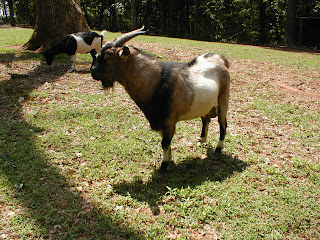
We spent most of our time in Yellowstone driving around looking at the animals that live in the park. The bison walk on the road and my sister is crazy about them so we saw lots of bison. At times they walked right beside the Suburban, their massive heads almost scraping the windows. We even saw one licking the bumper of the car in front of us. Never did figure out what you have to do to get that to happen, but it was a good threatening point with the kids. (Behave or we’ll smear you with peanut butter and tie you to the bumper!) It prompted the advent of the “peanut butter list.” (Mommy, am I on Aunt Julie’s peanut butter list?)
We also saw moose, coyote, mountain sheep, a black bear and some little spots I’m sure were wolves. Mom and Dad were locals and knew exactly where to go to see the “good animals.” At one point my brother-in-law went on point like a bird dog jumping out of the vehicle to see a mama grizzly and cubs. They were very far away – only visible through the binoculars and without his keen powers of observation we would have missed them. That was not true of the second grizzly bear.
It was our next to last day when we encountered the “bear jam,” a pile up of cars that usually meant a good animal sighting. I was sitting in the coveted shotgun seat. I’m shorter than everyone else in my family so I don’t get to sit in it often. We rolled down the window and a lady told us they had seen a grizzly bear, but it had walked off into the woods. By this point we were animal connoisseurs and didn’t stop for just anything. Besides the ranger was walking away from the bear jam and he wouldn’t be leaving if the bear was still there. The rangers are great at showing up when the bears do and protecting tourists from themselves.
We kept driving slowly; traffic wasn’t moving much. Eventually we pulled up beside the ranger and the bear was RIGHT THERE mere feet away. A huge grizzly bear was outside my window – my window. A man was eaten by a mother grizzly and her cubs a few weeks before we arrived in Yellowstone and my sister had read us excerpts of Death in Yellowstone. Grizzly bears are fast and unpredictable with really big teeth and claws. My mom handed me her camera to take pictures. I didn’t. I rolled up my window and tried to stay off of the peanut butter list. My family teased me mercilessly for being scared. I prefer to think of it as prudent, but I don’t think they will ever let me ride shotgun again.
We also saw moose, coyote, mountain sheep, a black bear and some little spots I’m sure were wolves. Mom and Dad were locals and knew exactly where to go to see the “good animals.” At one point my brother-in-law went on point like a bird dog jumping out of the vehicle to see a mama grizzly and cubs. They were very far away – only visible through the binoculars and without his keen powers of observation we would have missed them. That was not true of the second grizzly bear.
It was our next to last day when we encountered the “bear jam,” a pile up of cars that usually meant a good animal sighting. I was sitting in the coveted shotgun seat. I’m shorter than everyone else in my family so I don’t get to sit in it often. We rolled down the window and a lady told us they had seen a grizzly bear, but it had walked off into the woods. By this point we were animal connoisseurs and didn’t stop for just anything. Besides the ranger was walking away from the bear jam and he wouldn’t be leaving if the bear was still there. The rangers are great at showing up when the bears do and protecting tourists from themselves.
We kept driving slowly; traffic wasn’t moving much. Eventually we pulled up beside the ranger and the bear was RIGHT THERE mere feet away. A huge grizzly bear was outside my window – my window. A man was eaten by a mother grizzly and her cubs a few weeks before we arrived in Yellowstone and my sister had read us excerpts of Death in Yellowstone. Grizzly bears are fast and unpredictable with really big teeth and claws. My mom handed me her camera to take pictures. I didn’t. I rolled up my window and tried to stay off of the peanut butter list. My family teased me mercilessly for being scared. I prefer to think of it as prudent, but I don’t think they will ever let me ride shotgun again.





